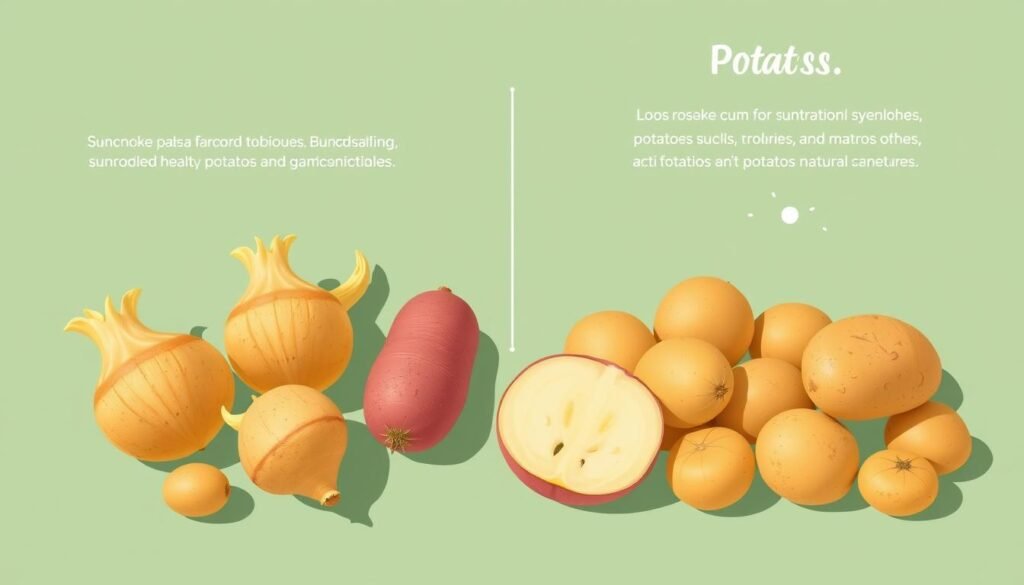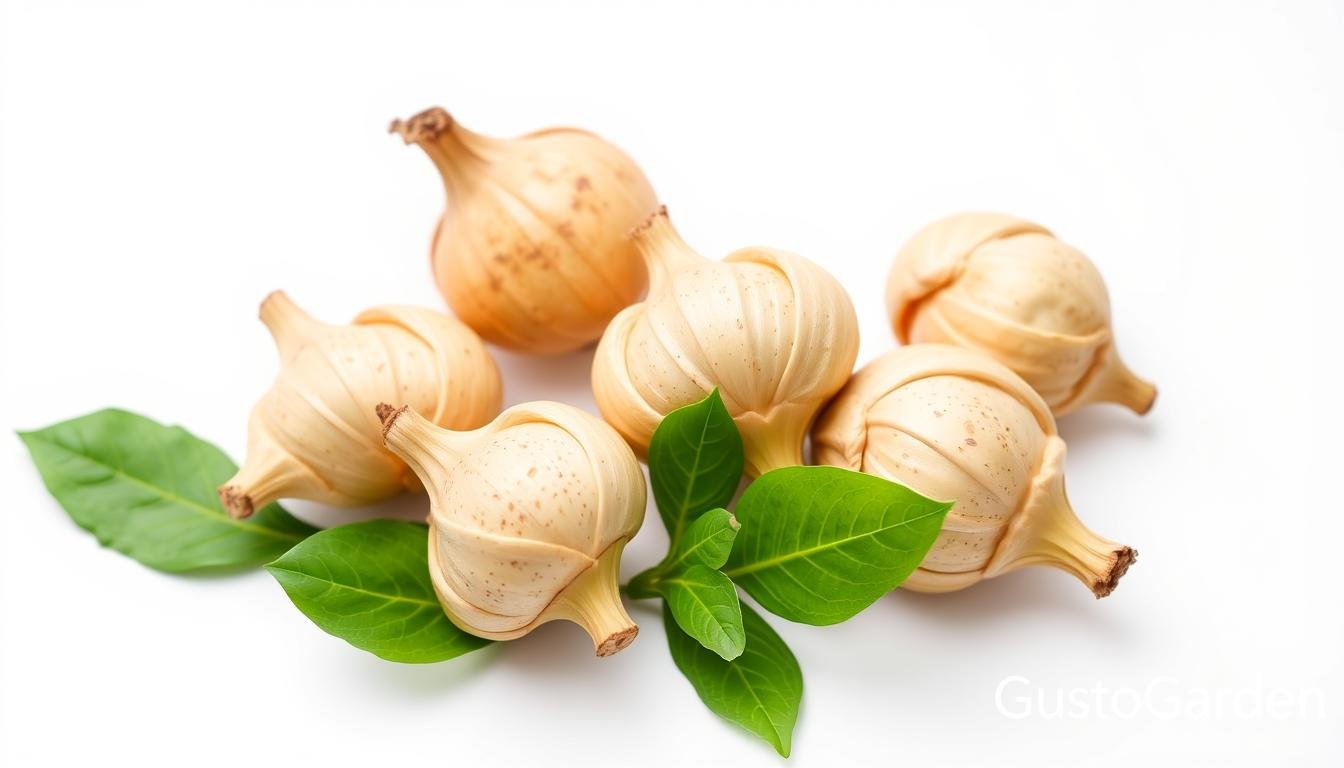Sunchokes, also known as Jerusalem artichokes, are a nutrient-rich root vegetable. They belong to the sunflower family and taste sweet and nutty, like chestnuts1. In this article, we’ll see if sunchokes are better than regular potatoes. We’ll look at their nutritional values, health perks, and how they stack up as a food choice. By the end, you’ll know more about sunchokes and if they’re a smart potato substitute.
Key Takeaways
- Sunchokes are considered superfoods because they’re packed with vitamins, minerals, and antioxidants.
- They’re a great source of complex carbs, fiber, and inulin, making them a healthier option than potatoes.
- With a lower glycemic index than potatoes, sunchokes are better for those watching their blood sugar.
- Sunchokes might help with gut, bone health, and even cancer prevention.
- Even though sunchokes are usually safe, some people might feel digestive issues because of their inulin.
Introduction to Sunchokes: The Nutty Tuber
Sunchokes, also known as Jerusalem artichokes, are a unique root vegetable. They belong to the sunflower family2. Despite their name, they are not related to artichokes. These knobbly, ginger-like tubers grow underground and are native to North America2.
They offer a delightful flavor profile. It’s like a mix of a potato and a chestnut, with a hint of artichoke3.
What are Sunchokes?
Sunchokes are a versatile ingredient. They can be enjoyed raw, roasted, steamed, or pureed2. Raw, they’re like water chestnuts. Cooked, they’re more like potatoes2.
They’re a good source of protein, vitamins A and C, phosphorus, potassium, iron, and other minerals2. They’re also rich in inulin, a carbohydrate good for low-starch diets2.
The Taste and Texture of Sunchokes
Sunchokes have a unique, nutty flavor3. Their texture changes from crisp and crunchy raw to soft and creamy cooked. This makes them versatile in the kitchen2.
Sunchokes are a perennial staple crop. They spread readily from their roots. They thrive in sunny to moderately shaded sites, in moist, fertile soils4.

“Sunchokes are one of the best sources of prebiotics, which are essential for feeding probiotics in the gut. They are also high in inulin, a compound that can lead to serious gas and bloating when consumed raw.”
Nutritional Value: Sunchokes vs. Potatoes
When we look at sunchokes and potatoes, we see some big differences. Sunchokes, also known as Jerusalem artichokes, have a bit more calories than potatoes. They have 110 calories per cup, while potatoes have 118 calories in a cup of diced form5. But, sunchokes have more protein, with 3g per serving, compared to potatoes’ 2g5.
Macronutrient Comparison
Sunchokes have fewer carbs, with 26.1g per serving, compared to potatoes’ 27g5. They also have more fiber, with 2.4g per serving, while potatoes have 2g5. This makes sunchokes a better choice for feeling full and being good for your gut.
Micronutrient Comparison
Sunchokes and potatoes each bring their own set of vitamins and minerals. Potatoes have more vitamin C, with 19.7mg per serving, compared to sunchokes’ 6mg5. But, sunchokes have more vitamin A, vitamin E, and iron5. They also have more calcium, with 21mg per serving, while potatoes have 10mg5. Both are great sources of potassium, with sunchokes slightly ahead5.
The glycemic index is another key difference. Potatoes have a higher glycemic index than sunchokes. This means potatoes can raise blood sugar levels faster6. So, sunchokes are a better choice for managing blood sugar or keeping a balanced diet.

“The nutritional value of sunchokes makes them a low-calorie, high-fiber alternative to potatoes, with additional benefits for bone health and blood sugar regulation.”7
In summary, sunchokes are a healthier option than traditional potatoes. They offer a range of vitamins, minerals, and plant compounds that support overall health and well-being.
Are sunchokes healthier than potatoes?
Sunchokes might be the healthier choice over potatoes. Sunchokes have fewer calories and carbs than regular potatoes, making them good for those on a low-carb diet8. They also have inulin, a fiber that helps your gut, while potatoes have resistant starch for similar benefits8.
Potatoes, however, are packed with vitamin C, B vitamins, and potassium8. They’re the fourth-largest food crop globally, showing their wide use and popularity8. Sunchokes, while less common, are easier to grow and need little care, growing well in many soils8.
| Nutrient | Sunchokes | Potatoes |
|---|---|---|
| Calories | 8Lower | 8Higher |
| Carbohydrates | 8Lower | 8Higher |
| Protein | 8Less | 8More |
| Inulin (Prebiotic Fiber) | 8Higher | 8Lower |
| Resistant Starch | 8Lower | 8Higher |
| Glycemic Index | 8Low | 8High |
| Vitamin C, Potassium, B Vitamins | 8Lower | 8Higher |
Choosing between sunchokes and potatoes depends on your diet and taste. Adding both to your meals can offer a good mix of nutrients8. Sunchokes might be better for some due to their lower carbs and more fiber. But potatoes are rich in vitamins and minerals that are important for health8. It’s all about what you prefer and how they fit into your healthy eating plan.
Health Benefits of Sunchokes
Sunchokes, also known as Jerusalem artichokes, are packed with a special fiber called inulin. This fiber acts as a prebiotic, feeding the good bacteria in our gut9. It helps improve digestion, boosts immunity, and can even control blood sugar levels9. Studies show that sunchokes can grow beneficial probiotics, reducing inflammation and improving gut health10.
Sunchokes also have other health perks. Just 100 grams of raw sunchokes have 73 calories, no fat or cholesterol, and 1.6 grams of fiber.9 They offer 2 grams of protein, 3.4 mg of iron (19% Daily Value), and 429 mg of potassium (9% DV).9 Their low glycemic index helps control blood sugar, making them good for diabetes or insulin resistance9.
Inulin: The Prebiotic Fiber
The inulin fiber in sunchokes is key to their health benefits. It feeds the good bacteria in your gut, helping them grow and thrive910. A 1-cup serving of sliced, raw sunchokes has 2.4 grams of fiber, which is 25% of the daily value.10 This fiber improves digestion, boosts immunity, and aids in weight management.
Blood Sugar Regulation
Sunchokes also help regulate blood sugar levels910. Their inulin slows down glucose absorption, preventing blood sugar spikes9. This makes sunchokes a good choice for managing blood sugar or maintaining healthy insulin levels.
Incorporating sunchokes into your diet can boost your gut health, support your immune system, and keep blood sugar levels healthy910.
Potential Drawbacks of Sunchokes
Sunchokes are good for health but can cause problems for some. The inulin in them might lead to gas, bloating, and discomfort. This is especially true for those with sensitive stomachs or irritable bowel syndrome11.
People with fructan intolerance or on a low-FODMAP diet should stay away from sunchokes. The fructans in them can make their symptoms worse.
Sunchokes can be a nuisance for farmers because they spread quickly11. They are hard to get rid of once they grow in a place12. Also, sunchokes might attract mice, which is a worry for gardeners12.
Another issue is that sunchokes don’t keep well11. Unlike potatoes, which can be stored for months, sunchokes only last a week or two in the fridge11. This makes them less popular than potatoes.
Not everyone will have digestive problems with sunchokes13. But, people with sensitive stomachs or certain dietary needs should be careful. They should think twice before adding sunchokes to their diet.
Cooking and Preparing Sunchokes
Sunchokes, also known as Jerusalem artichokes, are versatile in the kitchen. They can be enjoyed raw or cooked, affecting their texture and digestibility14.
Raw vs. Cooked Sunchokes
Raw sunchokes are crunchy and watery, like water chestnuts. They’re great in salads or as a snack, adding a refreshing crunch14. But, cooked sunchokes are softer and easier to digest.
They can be roasted, sautéed, or added to soups and stews14. Cooking breaks down their inulin, making them digestible and reducing stomach issues14. Cooked sunchokes also have a nutty flavor that goes well with many seasonings.
It’s key to harvest sunchokes after the first hard frost for better digestion14. Avoid eating them raw to prevent digestive problems14.
Sunchokes are great in many dishes, from paleo and low-carb recipes to comfort foods14. Their unique texture and flavor make them a nutritious and tasty addition to any meal.
Sunchoke Recipes and Uses
Sunchokes are a versatile ingredient for both sweet and savory dishes. They can replace potatoes in mashes, soups, and gratins. Thinly sliced, they add a nice crunch to salads15.
Pickled Sunchokes Recipe
Pickling sunchokes is one of my favorite uses. It makes a tangy, crunchy side dish. It’s great with grilled meats or on sandwiches. Here’s what you need:
- 1 pound sunchokes, scrubbed and sliced into thin rounds
- 1 cup apple cider vinegar
- 1/2 cup water
- 2 tablespoons sugar
- 1 teaspoon salt
- 1 teaspoon whole peppercorns
- 2 cloves garlic, peeled and halved
First, mix the vinegar, water, sugar, and salt in a saucepan. Bring it to a boil, stirring until the sugar dissolves. Let it cool a bit. Then, put the sunchoke slices, peppercorns, and garlic in a clean jar. Pour the vinegar mixture over them, making sure they’re covered. Seal the jar and chill for at least 2 hours. The pickled sunchokes will last up to 2 weeks in the fridge.
This pickled sunchoke recipe is a great way to sunchoke recipe ideas and how to use sunchokes. The pickled sunchokes recipe is a tasty side dish or condiment. It adds a delicious crunch and tanginess to any meal.
Buying and Storing Sunchokes
If you’re curious about sunchokes, also known as Jerusalem artichokes, you’ll find them in many grocery stores. They’re available more often in the fall and winter16. When shopping, look for firm, unblemished tubers without black spots or mold16.
Sunchokes come in various colors, sizes, and flavors. You can try different ones like Clearwater, Stampede, and Red Fuseau17. This lets you find your favorite17.
Proper storage is crucial for keeping sunchokes fresh and flavorful. Unlike potatoes, sunchokes can be stored in the ground16. This makes it easy to harvest them as needed16.
If you store them indoors, keep them in a cool, dark place. A root cellar or the crisper drawer of your fridge works well17. Don’t wash them before storing to prevent spoilage17.
Sunchokes add a unique flavor and nutritional value to any diet. Knowing where to buy and how to store them lets you enjoy them all year16. Whether you’re new or experienced with sunchokes, trying them is worth it16.
Conclusion
Sunchokes, also known as Jerusalem artichokes, are a great choice instead of regular potatoes. Research shows they have more fiber, vitamins, and minerals than potatoes18.
Sunchokes have a special fiber called inulin that’s good for your gut and blood sugar. They’re great for keeping blood sugar levels healthy, especially for people with type 2 diabetes1819. They also have potassium and other nutrients that help your heart and brain18.
Even though sunchokes taste and feel different from potatoes, they’re a nutritious and flexible food. As more research comes out, I think sunchokes will become more popular as a potato substitute2019.
FAQ
Are sunchokes healthier than potatoes?
Yes, sunchokes are healthier than potatoes in many ways. They have fewer calories and more fiber. They also have less carbs and a bit more protein. Plus, sunchokes offer more vitamins and minerals.
What are the health benefits of sunchokes?
Sunchokes are full of inulin, a special fiber. This fiber feeds the good bacteria in your gut. It helps with digestion, boosts immunity, and controls blood sugar.
The inulin in sunchokes also grows good bacteria. This reduces inflammation and keeps your gut healthy.
Are there any potential drawbacks to eating sunchokes?
Yes, sunchokes can cause digestive issues for some. The inulin can lead to gas, bloating, and discomfort. People with sensitive stomachs or irritable bowel syndrome should be careful.
Those with fructan intolerance or on a low-FODMAP diet should also avoid sunchokes. The fructans can make their symptoms worse.
How should sunchokes be prepared and cooked?
You can enjoy sunchokes raw or cooked. Raw sunchokes are crunchy and watery, like water chestnuts. Cooked sunchokes are softer, like potatoes.
You can slice them thin for salads or platters. Or roast them. They’re great as a potato substitute in many dishes.
Where can I find and purchase sunchokes?
You can find sunchokes in the produce section of big grocery stores. They’re available in the fall and winter. Look for firm, unblemished tubers without black spots or mold.
There are different varieties like Clearwater, Stampede, and Red Fuseau. They come in various colors, sizes, and flavors.
Source Links
- https://annamariasfoods.com/health-benefits-of-sunchokes-jerusalem-artichokes-recipe/ – Health Benefits of Sunchokes
- https://grownative.org/project/crunchy-and-healthy-sunchokes/ – Crunchy and Healthy Sunchokes – Grow Native!
- https://www.befresh.ca/blog-sunchokes-be-fresh/ – Sunchokes: The Best Veggie To Boost Your Gut Health – Be Fresh Blog
- https://www.ourochreway.com/sunchokes-a-tasty-and-reliable-homestead-crop/ – Sunchokes! A Tasty and Reliable Homestead Crop
- https://thekitchencommunity.org/jerusalem-artichoke-vs-potato/ – Jerusalem Artichoke vs Potato
- https://lauracipullo.com/blog/sunchokes-the-veggie-of-2020/ – Sunchokes: The Veggie of 2020 | Laura Cipullo
- https://www.stylecraze.com/articles/what-are-sunchokes/ – Sunchoke: Nutrition Facts, Benefits, And How To Prepare
- https://www.savorysuitcase.com/jerusalem-artichoke-vs-potato/ – Jerusalem Artichoke vs Potato: A Comprehensive Comparison
- https://www.eatingwell.com/article/8009707/what-are-sunchokes/ – What Are Sunchokes?
- https://www.livestrong.com/article/374796-health-benefits-of-jerusalem-artichokes/ – Health Benefits of Jerusalem Artichokes | Livestrong.com
- http://natures-restaurant-online.com/JerusalemArtichoke.html – Jerusalem Artichoke or Sunchoke: Nature’s Restaurant: A Complete Wild Food Guide
- https://www.growveg.com/guides/growing-jerusalem-artichokes-sunchokes/ – Growing Jerusalem Artichokes (Sunchokes)
- https://thekitchencommunity.org/jerusalem-artichoke-vs-potato-2/ – Jerusalem Artichoke vs. Potato
- https://bitofearthfarm.wordpress.com/2015/04/16/to-sunchoke-or-not-to-sunchoke/ – To Sunchoke Or Not To Sunchoke
- https://theproducepack.com/whole30-sunchoke-hash/ – Whole30 Sunchoke Hash – Produce Pack
- https://permies.com/t/204599/Maximizing-area-production-sunchokes-main – Maximizing area production with sunchokes as the main crop (plants forum at permies)
- https://www.cultivariable.com/instructions/root-crops/how-to-grow-jerusalem-artichoke/ – Jerusalem Artichoke (Helianthus tuberosus) – The Cultivariable Growing Guide
- https://www.healthifyme.com/blog/jerusalem-artichoke/ – Jerusalem Artichoke: A Healthier Alternative – HealthifyMe
- https://savvytokyo.com/do-you-know-what-this-is-sunchokes/ – Do You Know What This Is? Sunchokes – Savvy Tokyo
- https://www.ncbi.nlm.nih.gov/pmc/articles/PMC7750793/ – Nutritional value, bioactivity, and application potential of Jerusalem artichoke (Helianthus tuberosus L.) as a neotype feed resource

